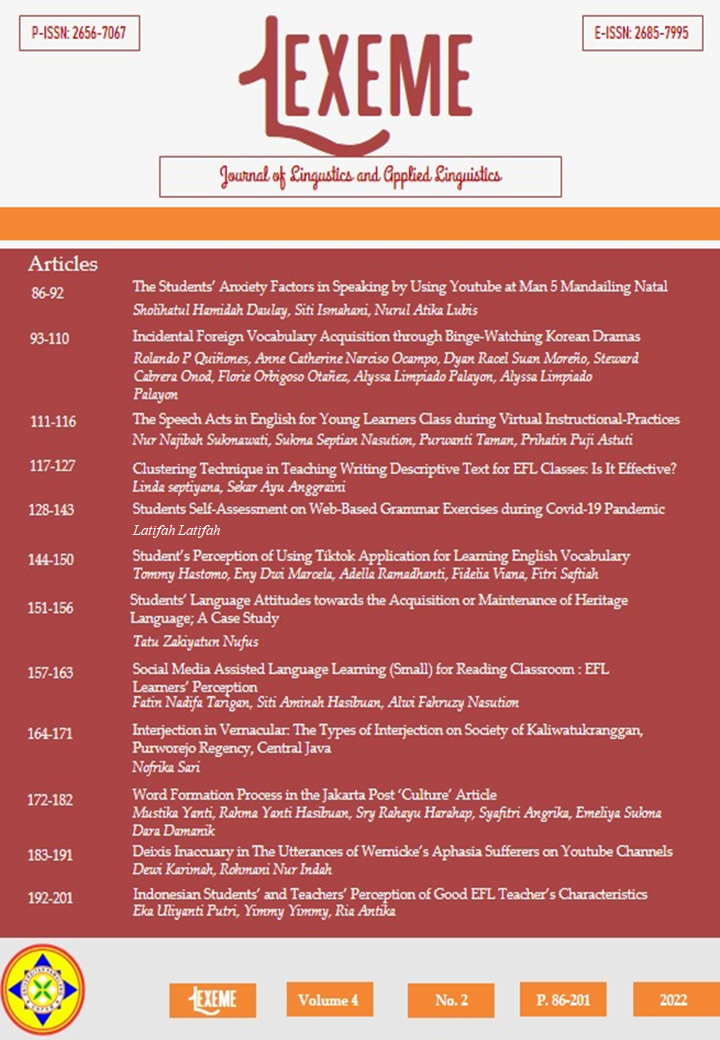SOCIAL MEDIA ASSISTED LANGUAGE LEARNING (SMALL) FOR READING CLASSROOM : EFL LEARNERS’ PERCEPTION
DOI:
https://doi.org/10.32493/ljlal.v4i2.21406Keywords:
perception, reading, Social Media Assisted Language Learning (SMALL)Abstract
Addressing the issue of the dynamics of social media as tool for learning, the present study aims at investigating the perception of English language learners towards the use of social media in the teaching learning activities especially for reading classroom. By using qualitative research, this study focuses on learner’s perceptions towards social media assisted for language learning (SMALL) in reading classroom. A total of 72 English language education learners at Universitas Pembinaan Masyarakat Indonesia participated in this study through 5 point Likert scale survey and interview. As the result, social media got positive perceptions from the learners. The dominant social media platform used was Instagram then following Youtube, Tiktok and Whatsapp. These learners believed that social media could be used as a tool for language learning that enhance learners' language skills especially reading and engage them better with lecturers and classmates in learning activities.References
Akram, W., & Kumar, R. (2018). A Study On Positive And Negative Effects Of Social Media On Society. International Journal Of Computer Science And Engineering, 5(10). 350-351. Doi:10.26438/Ijcse/V5i10.351354
Al Arif, T. Z. Z. (2019). The Use Of Social Media For English Language Learning: An Exploratory Study Of EFL University Students. Metathesis: Journal Of English Language, Literature, And Teaching, 3(2), 224-233.
Baſöz, T. (2016). Pre-Service EFL Teachers: Attitudes Towards Language Learning Through Social Media. Procedia - Social And Behavioral Sciences, 232, 430–438. Https://Doi.Org/10.1016/J.Sbspro.2016.10.059
Crook, C. (2008): Web 2.0 Technologies For Learning: The Current Landscape – Opportunities, Challenges And Tensions, Nottingham: Becta: Leading Next Generation Learning
Encyclopedia Of Social Media And Politics (Pp. 1158-1162). Thousand Oaks, CA: Sage.
Henderson, M., Selwyn, N., & Aston, R. (2017). What Works And Why? Student Perceptions Of ‘Useful’ Digital Technology In University Teaching And Learning. Studies In Higher Education, 42(8), 1567–1579. Https://Doi.Org/10.1080/03075079.2015.1007946
Https://Datareportal.Com/Reports/Digital-2021-Indonesia accessed on January 1, 2022.
Liburd, Janne J. Og. Christensen, Inger-Marie F. (2011): “Web 2.0 I Videregående Uddan-Nelser†Idéhæfte Fra Evidencenter® – Det Nationale Videncenter For Elæring Århus Købmandsskole Viborgvej 159A, Hasle 8210 Århus V.
Manning, J. (2014.) Social Media, Definition And Classes Of. In K. Harvey (Ed.),
Manning, J. (2014.) Social Media, Definition And Classes Of. In K. Harvey (Ed.), Encyclopedia Of Social Media And Politics (Pp. 1158-1162). Thousand Oaks, CA: Sage.
Moody, Mia (2010): “Teaching Twitter And Beyond: Tips For Incorporating Social Media In Traditional Coursesâ€, I Journal Of Magazine & New Media Research. Vol. 11, No. 2, Pp 1-9.
Mubarak, Alkhatnai. Utilization Of Social Networks Among Saudi EFL Learners: Trends And Uses. (2016). European Scientific Journal December 2016 Edition Vol.12, No.35 ISSN: 1857 – 7881 (Print) E - ISSN 1857- 7431. (Online) Available: Https://Eujournal.Org/Index.Php/Esj/Article/Viewfile/8530/8200
Rosell-Aguilar, F. (2018). Twitter As A Formal And Informal Language Learning Tool: From Potential To Evidence. Innovative Language Teaching And Learning At University: Integrating Informal Learning Into Formal Language Education, 99-106.
Sharma, V. (2019). Saudi Students' Perspective On Social Media Usage To Promote EFL Learning. Online Submission, 2(1), 129-139.
Shin, D. S. (2018). Social Media & English Learners‟ Academic Literacy Development. Multicultural Education, 25(2), 13–16.
Tarigan, F. N., & Hasibuan, S. A. (2021). The Effect Of Digital Storytelling to Improve university students’ reading Skils And Self Efficacy. Jurnal Education And Development, 9(4), 404-406.
Watie, E. D. S. (2016). Komunikasi Dan Media Sosial (Communications And Social Media). Jurnal The Messenger, 3(2), 69-74.
Zayed, J., & Al-Ghamdi, H. (2019). The Relationships Among Affective Factors In Learning EFL: A Study Of The Saudi Setting. English Language Teaching, 12(9), 105-121.







